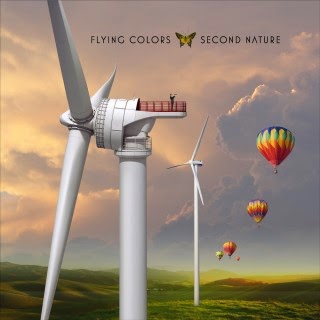Second Nature, the second album by supergroup Flying Colors, is an odd release. It's odd because whether or not the listener is new to the music of Neal Morse will profoundly influence their reactions.
Those new to the musings of Morse, and progressive rock as a whole, will be blown away by the technical histrionics, the catchy hooks, and the polished songwriting we've come to expect from anything he's involved with. For some, it may be one of the best albums they've ever heard, with them saying things like, "Why isn't all music like this?" And, "Why aren't these guys more famous?"
For the rest of us, however, the album will seem all too familiar, if not a bit formulaic. In fact, the first track, "Open Up Your Eyes," sounds like an extra track from Transatlantic's Kaleidoscope, which makes sense because these songs were probably written around the same time. The closing epic "Cosmic Symphony" is classic Morse-style prog, complete with the quasi-religious lyrics and bombastic closing crescendo that have become the hallmarks of his style.
The songs in between are mostly long-form songs as well, with only one, "Lost Without You," clocking in at under five minutes. The standout track is the first release, "Mask Machine." It's the only track that truly seems different than what the band members have done in the past with their other projects. The rest of the shorter songs are enjoyable, even if the power ballad "The Fury of My Love" is sprinkled with its fair share of cheese. "A Place in Your World" features three different lead vocalists and is a great short prog song. "One Love Forever," while being an obvious religious statement, has some of the most interesting instrumental passages, especially the neo-folk A-section. The gospel-tinged "Peaceful Harbor" evokes old Spock's Beard, and even Neal's latest solo album, with its full gospel choir section. It's a bit over the top, but hey, this is prog.
There are a few problems with this album. First, is has a more serious, somber tone. Their first self-titled release seemed like five guys having fun and branching out into a style of music that they normally don't play. I don't see that sense of fun in Second Nature. Also, while I understand that Morse has been born again for nearly 15 years, his efforts to inject religion into his secular projects are getting tired. The problem with Christian musicians in general is that, with limited subject matter, they end up writing the same songs over and over again. This is also an issue with Neal's solo work, as the same themes crop up again and again.
I don't want to ignore the other members of the group - Mike Portnoy is solid as ever on the drums, even though some of his fills are getting repetitive, and his vocals are ever improving; Casey McPherson's voice is soulful and interesting; and Steve Morse and Dave LaRue are both legends that need no introduction - but Neal dominates this album, and since he's always had good pop sensibilities to go along with his progressive nature, he is completely comfortable wading in this pool.
But it's that pop/prog mix that is the biggest problem with this album. It's not prog enough to satisfy die-hard progheads, and it's too prog for the casual pop/rock fan. Stood next to albums like Steven Wilson's excellent The Raven that Refused to Sing (And Other Stories), or even the aforementioned Kaleidoscope, it falls flat, and put up against other pop/rock albums, including Flying Colors' debut, it also falls flat. It's Prog Lite. It's the album that progheads will cue up when their wives are in the car (yes, I know it's a bit sexist, but let's face it - the progressive rock fanbase is a big sausage fest). But it's also a gateway drug for pop/rock fans who are interested in progressive rock, or perhaps it's even a compelling enough taste of prog that it may actually lure unsuspecting rock fans to the dark side.
It's a bit disappointing that, because of the more progressive leanings of Second Nature, Flying Colors is no longer the "something different" that these guys do away from their usual gigs. It's just another Morse/Portnoy project, and it's edging ever closer to Transatlantic and Neal Morse's solo work. Because of this, and because of the schizophrenic nature of the album (not quite pop, not quite prog), Second Nature, while still a fine record, only manages a score of 3.5 out of 5. Existing fans of the band members' other projects will love it and most prog fans will at least enjoy it, which will probably be enough to land it on many critics' top ten lists for 2014. The album does become better with repeated listens, and maybe their version of accessible prog will flourish to the point of actual radio play. Prog fans everywhere can only hope, because if any one band could do it, Flying Colors can.


No comments:
Post a Comment